By Ray Waddle
From the ceremonial platform last month, Registrar Lisa Huck ‘88 M.Div. was taking in her final YDS commencement—the fondly familiar processional, the students’ excitement, the faculty remarks to the new graduates. Then Dean Greg Sterling, standing at the podium, turned to her and made an announcement. Everything went foggy for her after that. She heard the word “scholarship,” then an ovation, then students chanting “Lisa, Lisa!”
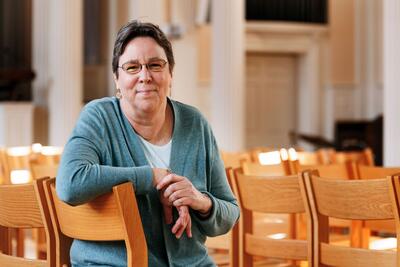 The school she has served for 40 years had just established a scholarship in her honor. Some $50,000 had already been raised or pledged. Somehow, everyone had managed to keep it a secret until the big reveal that afternoon. Preparing to retire at the end of this month, she was astounded at this parting act of affection and thanks.
The school she has served for 40 years had just established a scholarship in her honor. Some $50,000 had already been raised or pledged. Somehow, everyone had managed to keep it a secret until the big reveal that afternoon. Preparing to retire at the end of this month, she was astounded at this parting act of affection and thanks.
“I thought the School might acknowledge me, give me flowers, and that would be that,” she said. “But not this. I’m still speechless.”
Her amazement was compounded by her own sense of the haphazard turns of her multifaceted Yale career. Growing up, she thought about becoming a school psychologist or an architect. Instead, she started work in the Yale purchasing department. After finishing her YDS M.Div. degree in 1988, she ran the YDS bookstore for 20 years. Then she was hired as YDS registrar in 2008. In the midst of all this, she became a hospice volunteer, a regional lay leader in her Lutheran denomination—and a licensed hot-air balloon pilot, too.
Her zigzag experience of vocational calling was never by-the-book. But looking back, she sees she was on a path all along.
“By now I’m on Plan G or H for my life,” she says. “Plan A was rejected right away, then B and C. Here’s my secret: I was never actually trained for any of the jobs I had! I realized I wasn’t called to be one thing. I was called to be a Christian—not a registrar or a manager but a child of God.”
She hopes such a message will encourage and embolden new alums in moments of vocational panic or inadequacy: “They need to know there’s a place for them in the world, and they have vital contributions to make no matter where they go next.”
She got to make that point to graduating students themselves the day before commencement: she was honored to be chosen to give the annual charge to new graduates in remarks during the YDS commencement worship service.
“And whether it was contributions you made as a leader, gifts you shared in chapel, insights you offered in your scholarship, the lunch time you shared with someone who needed you in that moment, the resilience you modeled for others, or even just the smile and kind words in the hallway that made someone’s bad day a little lighter, every one of you—each one of you—has made YDS a better place,” she declared during the service.
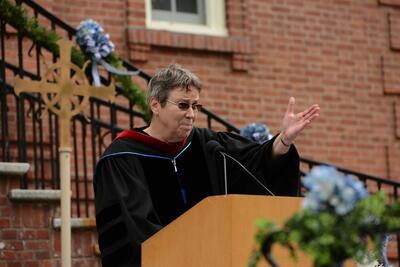 She took the occasion to quote noted theologians Winnie the Pooh and Peter Rabbit on the importance of balancing work and play and staying connected to one’s inner core of resilience and courage. She ended by citing Journey’s anthemic big hit “Don’t Stop Believin’”—telling students that even the smallest act can spark change.
She took the occasion to quote noted theologians Winnie the Pooh and Peter Rabbit on the importance of balancing work and play and staying connected to one’s inner core of resilience and courage. She ended by citing Journey’s anthemic big hit “Don’t Stop Believin’”—telling students that even the smallest act can spark change.
“Don’t stop believing that there’s something within you, at this moment, that can help heal creation,” she said.
In an interview days later, she said crafting the charge message came surprisingly easy to her—she’s been living into it for decades through her countless interactions with students.
“It came from my heart and from the Holy Spirit and from my years of working with students, knowing the burdens they carry. I suspect I was speaking to myself too, my 25-year-old self, telling them what I needed to hear at their age, to be reminded we all have a unique combination of gifts to offer.”
Lisabeth Huck’s journey began in Monroe, Conn., where she grew up. Her mother was an artist, her father a CPA. As a youngster she was a churchgoer (first Presbyterian, then Lutheran). She got interested in youth counseling and went to Penn State to pursue psychology and education. By senior year, religion looked more interesting. Her involvement in Lutheran campus ministry reinforced the impression. Then she graduated. It was 1979. Now what? She wasn’t sure.
“Mentors on campus were telling me I didn’t have to decide for the rest of my life—the question is what did I want to do next? I really wanted to study religion. They said, ‘Well, do that!’ And they had all gone to YDS, so that’s the only place I applied to, sight unseen.”
She applied to YDS too late for Fall 1979 admittance, so she delayed it a year, working for the Evangelical Lutheran Church of America, leading youth ministry trainings and doing campus ministry in Boston. Arriving at YDS in Fall 1980, she had no official denominational sponsorship but hoped to get clarity about a church calling. She loved her coursework (she recalls the late professor Bonnie Kittel leading Hebrew class by singing the alphabet). She was also going into debt. So she took an official leave after her second year—and got her first Yale job, tracking equipment for University maintenance contracts in Yale’s administrative purchasing department.
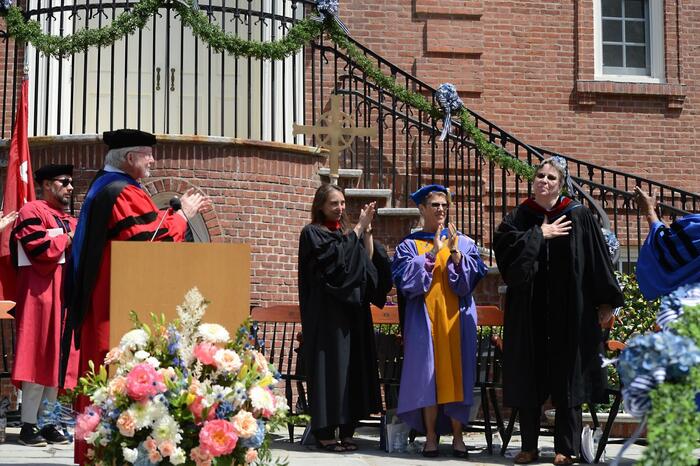 “After year five of that, something felt unfinished,” she recalled. “I had a vague sense I could be a church lay professional, and the M.Div. would help. I wanted to finish what I had started. So I went back and got the degree—and soon the YDS bookstore job opened up. I had been wondering what I was going to do with a theological degree and five years of purchasing experience. Then there it was: become the buyer-manager for a theological bookstore!”
“After year five of that, something felt unfinished,” she recalled. “I had a vague sense I could be a church lay professional, and the M.Div. would help. I wanted to finish what I had started. So I went back and got the degree—and soon the YDS bookstore job opened up. I had been wondering what I was going to do with a theological degree and five years of purchasing experience. Then there it was: become the buyer-manager for a theological bookstore!”
Without any retail management experience, she guided the bookstore through stormy times. When she took over in 1988, it was located in a leaky basement of Bellamy apartments. There was talk of closing it, but she convinced YDS administration to move it to a dedicated space on the Quad in 2001 as part of the School’s historic campus renovation. There the store did a brisk business into the new millennium until a new threat emerged: Amazon.
“The store was getting stressful. It was getting harder to make the money to pay staff while online competition was getting stronger and stronger.”
In 2008, legendary YDS registrar Detra MacDougall retired after 45 years at the School. Detra was a friend of hers, but Lisa had no thought of applying for the job.
“Then Grace Pauls (beloved executive assistant to YDS deans across four decades) handed me an envelope. It was the job description for registrar, Detra’s job. Apparently, I had all the things they were looking for.”
The position of Director of Academic Services and Registrar requires great attention to the accuracy of student records, registration, knowledge of curriculum and Yale policies, and the nitty-gritty of a thousand other procedural details. As Lisa regarded it, the work called for another skill, too, one that wasn’t spelled out in the job description: an ability to listen reassuringly to students, hear their hopes and worries.
It was her favorite part of the job. She was a school counselor after all.
“I have a lot of conversations with students that start with something administrative like how to get an extension or drop a course, and then the subject quickly shifts and there’s a much bigger personal story they want to tell,” she said.
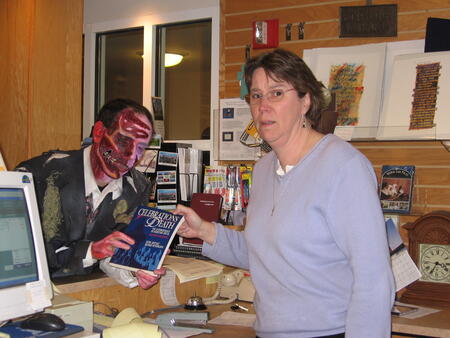 “Students are always anxious about their place in the world. In earlier years it was about their place in the church, anxiety about being ordained or not, being good enough or not. Now it’s more a global anxiety. With social media, everything is in your face all the time. Still, I think our students are pretty darn confident—they’re amazing. That hasn’t changed. They’re incredibly talented, incredibly committed to changing the world. It happens in different ways now, through different channels, different media. But our young people are on fire for change. They give me hope for the church and the world.”
“Students are always anxious about their place in the world. In earlier years it was about their place in the church, anxiety about being ordained or not, being good enough or not. Now it’s more a global anxiety. With social media, everything is in your face all the time. Still, I think our students are pretty darn confident—they’re amazing. That hasn’t changed. They’re incredibly talented, incredibly committed to changing the world. It happens in different ways now, through different channels, different media. But our young people are on fire for change. They give me hope for the church and the world.”
Her office presence long ago earned her a sly honorific around campus. She’s the Oracle.
“The title was first conferred on her (informally and behind her back) by students many years ago, but I have kept referring to Lisa as the Oracle in many advising sessions with students,” says Teresa Berger, Professor of Liturgical Studies and the Thomas E. Golden Jr. Professor of Catholic Theology.
“Whenever a question would come up about the always-changing curricular requirements, which I myself was not quite sure how to answer, my mantra was ‘Ask the Oracle.’ Sending a student straight from my office to Lisa’s, with that mantra, unfailingly produced clarity for the student, and usually a good measure of calm reassurance, too. Thanks be to God for YDS’s own Oracle.”
Through these decades, she found another way to apply her ability to listen and empathize: she was a volunteer at Connecticut Hospice for 27 years, offering weekly bedside spiritual care, pastoral home care, and bereavement group leadership, practices she first learned during her YDS field work student days.
“I found that I have the ability to sit with people in difficult times—at least, I’m told that I have a calming presence for them.”
For almost 20 years she has also been active in the Evangelical Lutheran Church in America—on the candidacy committee for the New England Synod, working with ministerial candidates as they discern or prepare for a public ministry in the denomination.
“In candidacy committee, we’re always talking about call—I know enough to believe that the call can come through other people rather than someone hearing distinctly the voice of God: you know you have gifts because you’ve heard from other people that you have them.”
It’s important to stay open to surprise and allow God to work in God’s own ways, she said. Sometimes to her own bafflement, she found ways to connect her skills, faith, and sense of mission through unexpected turns.
“I never really planned for the careers I’ve had—I got degrees, but I never quite knew what they were for. Yet by doing these many things, it all came together—my love of the church, my conviction I was called to something in the church, my interest in working with people in crisis, students in crisis, my work in hospice with dying and grieving, and my analytical skills as bookstore manager and then registrar.”
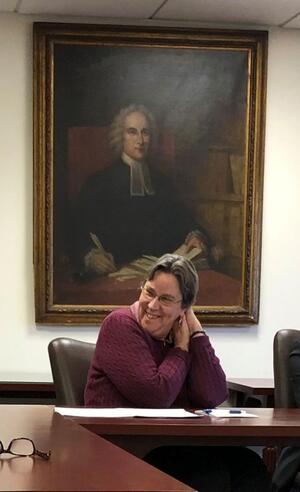 The Divinity School, she said, made all this possible.
The Divinity School, she said, made all this possible.
“So many of the things that have been meaningful in my life since I was 22 when I came to YDS are because of YDS—the hospice care, the ELCA candidacy committee, the registrar job, which is the best job I’ve ever had.”
Her work as registrar was always something else too—a ministry, as her colleagues have long noticed.
“Lisa accomplishes the mechanics of her work with excellence, precision, and accuracy, to her credit, and to the benefit of students and faculty alike,” says Dale Peterson, who was YDS Dean of Students from 2000 to 2015.
“But the mechanics are only the beginning of Lisa’s work, or only the framework. What Lisa does best and most effectively is minister to all people who cross her path on any given day. She values each person she meets, and she holds each request made of her in both her heart and mind. And she supports her colleagues. She understands that the school is at its best when it is a collaborative effort by all staff and faculty.”
She also loves doing theatre. And taking whale-watching trips. And she’s on the board at Tabor Christian Community Preschool in Branford. And, out of the blue, she pilots hot-air balloons for fun on weekends.
“It’s just a bunch of friends getting out on a beautiful morning, assembling the balloon, taking a ride, chasing it on the ground. It’s an art and a science. It’s problem-solving: laying the basket on the side, unpacking the deflated envelop, attaching the cables, heating it up so it goes up, cooling it down and it goes down.”
She and her crewmates might typically start at sunrise, travel 10 miles at around 1,000 feet, and land an hour later. Never mind that she has a basic fear of heights.
“When you’re lifting off in a balloon it feels more like the land is dropping away from you. There’s not a sense of motion. It’s not like an elevator going up. You’re on the wind, not resisting it. After the initial fear, it’s just cool, a sense of liberation, seeing the world from that angle.
“You’re constantly navigating—you can’t plan precisely from the start where you’ll land. The wind might shift. But based on wind speed and direction and your own calculations, you have a rough idea of where you’ll end up.”
That navigational description might serve as a rough-and-ready definition of vocational calling as lived out by Lisa Huck under the heavens among a grateful YDS community of students, faculty, staff, alums—and now future seminarians who’ll benefit from a new YDS scholarship in her name.